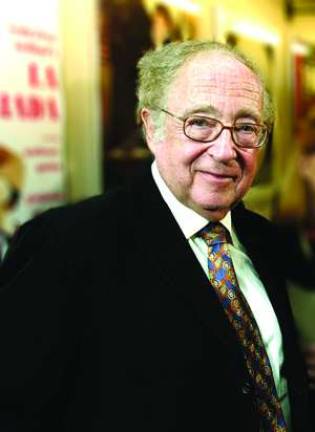Tribute for Symphony Space Founder

Last week, Symphony Space held a memorial celebration for Isaiah Sheffer, the theater's co-founder who passed away in November. Family, co-workers and actors whose lives were touched by Sheffer shared stories about the 76-year-old Bronx native, who was best known for masterminding "Selected Shorts," a nationally syndicated radio program in which famous actors read popular short stories, and "Bloomsday on Broadway," an annual front-to-back reading of James Joyce's Ulysses. "Isaiah's spirit of adventure was boundless," said Katherine Minton, Symphony Space's director of literary programs, who organized Selected Shorts with Sheffer. She recalled his creativity in organizing literary festivals like a reading of F. Scott Fitzgerald's Great Gatsby in Battery Park and a Walt Whitman celebration on the 100-year anniversary of the writer's death. "Isaiah was fun, always fun," she said, echoing a common description of the creative visionary. Sheffer was characterized as clever, eccentric and tenacious. When he first booked Symphony Space at Broadway and West 95th Street to stage a marathon Bach concert with conductor Allan Miller, the building was a derelict movie theater. But Sheffer saw potential: He wanted to turn the space into a premier venue for the performing arts. He and Miller endured a decade of fundraising and litigation to secure ownership of the building, and fought just as long and as hard to preserve it. Steven Alden, a lawyer who represented Symphony Space from its inception, recalled Sheffer rejecting developers that would include a theater in their plans for the building but wanted to move it to the basement or on the second floor. Sheffer insisted on maintaining the original theater on the street's level. "His plans for the place were so improbable," laughed Kay Cattarulla, who met Sheffer after the Bach concert and later became a member of the theater's board of directors and helped launch Selected Shorts. She quoted him by saying that she was so happy now that the building was "not one more Duane Reade." Sheffer was Symphony Space's artistic director for 32 years. He booked an eclectic, genre-spanning range of theatrical, musical and other performances in the space's two theaters, from political cabarets to African dance recitals. A performer himself, he was especially known for song parodies and little skits he would do to introduce acts or solicit donations during Selected Shorts intermissions. Videos at the celebration showed Sheffer singing about his mock-adoration for Paul Krugman's New York Times op-ed column and praising arugula to the tune of the Beatles' "Yesterday." Many speakers shared anecdotes of Sheffer's humor, including an impromptu fake shouting match with Morgan Freeman around a passersby in the middle of a street, and a joke he loved to tell people after suffering the stroke that eventually led to his death: "I've had a stork, but it hasn't affected my speech or anything." Sam Norich, publisher of the Jewish American newspaper The Forward, and Aaron Lansky, founder of the National Yiddish Book Center, praised Sheffer for his contributions to the Jewish community. He appeared in numerous Yiddish plays and radio programs, and had a strong command of the language. "Isaiah personified the culture I sought to preserve," said Lansky. "He was an original. Jewish through and through." Ethel Sheffer, Isaiah's wife, remembered her husband as "endlessly patient" and deeply passionate about stories. "He loved when I read short stories aloud to him," she said. Susannah Sheffer, the couple's daughter, recalled her father telling her long bedtime stories about his childhood and creating characters for her enjoyment. "It was important for him to show me what he loved," she said. The two wrote poems for each other throughout Sheffer's life, and read to each other often. Susannah said that words were not enough to describe her father's passing and the loss to the Symphony Space community. She ended her speech with a quote from a poem by Jane Hirshfield, one of the last she and her father read together: "I make these words for what they can't replace."